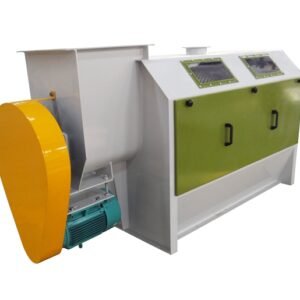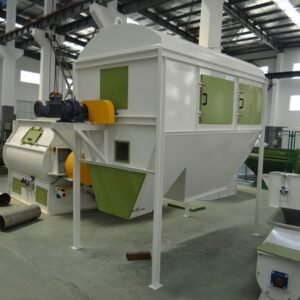Description
Technical Specifications & Design Features
Filtration System & Component Engineering
-
Filter Cartridges: Pleated cellulose, polyester, or nanofiber media with 50-400 ft² surface area each
-
Cleaning Mechanism: Top-access pulse tubes with precision nozzles for 360° cleaning
-
Housing Construction: 14-10 gauge carbon steel, 304/316 stainless, or galvanized finishes
-
Pressure Rating: -8 to -15 inches WC operational differential pressure
System Configuration & Dimensions
-
Unit Diameter: 18-60 inches standard with custom sizes available
-
Filter Count: 2-36 cartridges depending on airflow requirements
-
Height Requirements: 60-120 inches including hopper and clean air plenum
-
Footprint Efficiency: 25-40% smaller than equivalent rectangular collectors
Performance & Operational Specifications
-
Airflow Capacity: 500-10,000 CFM with variable frequency drive options
-
Air-to-Cloth Ratio: 2:1 to 5:1 depending on dust characteristics
-
Collection Efficiency: 99.9-99.99% on particles down to 0.3 microns
-
Noise Level: 70-80 dBA at 3 feet distance
Application-Specific Performance Data
| Industry Application | Typical Airflow (CFM) | Filter Media Recommended | Efficiency Rating | Maintenance Interval |
|---|---|---|---|---|
| Welding & Metal Fabrication | 800-3,500 | Nanofiber/PET composite | 99.99% @ 0.3μm | 3-6 months |
| Laser Cutting & Engraving | 1,000-4,000 | Fire-retardant cellulose | 99.97% @ 0.3μm | 6-12 months |
| Pharmaceutical Processing | 500-2,000 | PTFE membrane | 99.99% @ 0.3μm | 12-18 months |
| Woodworking & Furniture | 1,500-6,000 | Anti-static polyester | 99.95% @ 1.0μm | 6-9 months |
| Additive Manufacturing | 300-1,500 | HEPA-grade media | 99.99% @ 0.3μm | 12-24 months |
Operational Advantages:
-
Compressed Air Consumption: 30-50% less than shaker-style collectors
-
Installation Flexibility: Roof mounting, mezzanine placement, or direct machine connection
-
Changeout Efficiency: Individual cartridge replacement without system shutdown
-
Dust Discharge: Multiple hopper configurations including drum-top and rotary valve
Industry Implementation & Operational Benefits
Metal Fabrication & Welding Operations
Round pulse filters excel in capturing welding fumes and metal dust at source. The compact design allows placement near welding cells without obstructing workflow. One automotive parts manufacturer installed 12 units throughout their fabrication area, reducing ambient particulate levels from 3.2 mg/m³ to 0.8 mg/m³ while using 40% less compressed air than their previous central collection system.
Laser Cutting & Thermal Processing
For laser cutting applications, round filters with fire-retardant cartridges and spark arrestance provide critical safety protection. The efficient pulse cleaning maintains consistent airflow despite heavy smoke generation. A sheet metal fabricator reported 99.97% efficiency in capturing stainless steel cutting emissions while extending filter life from 6 to 14 months through proper pulse control optimization.
Pharmaceutical & Chemical Processing
GMP-compliant round filters with polished stainless construction meet stringent hygiene requirements. The contained filter change process prevents cross-contamination during maintenance. A pharmaceutical company processing active ingredients achieved 99.99% containment while reducing filter replacement labor by 65% compared to their previous baghouse system.
Additive Manufacturing & 3D Printing
As industrial 3D printing expands, round pulse filters effectively capture ultrafine particles from polymer and metal printing processes. The high-efficiency nanofiber media captures nanoparticles while the compact footprint fits within equipment enclosures. One aerospace additive manufacturing facility maintained consistent <0.1 mg/m³ ambient levels during metal powder bed fusion processes.
Operational Economics & Maintenance Planning
Total Cost of Ownership Analysis
-
Equipment Investment: $3,500-$25,000 based on size and construction
-
Installation Costs: $500-$3,000 for simple bolt-down applications
-
Energy Consumption: $400-$2,000 annually for compressed air and fan power
-
Filter Replacement: $800-$4,000 per change depending on cartridge quantity and quality
Maintenance Optimization Schedule
-
Daily: Visual inspection, pressure drop recording
-
Weekly: Pulse valve operation check, hopper evacuation verification
-
Monthly: Filter condition inspection, gasket integrity check
-
Annually: Complete system audit, safety system verification
Performance Monitoring Parameters
-
Differential Pressure: Target range 4-8 inches WC for optimal performance
-
Pulse Interval: Adjust based on dust loading to extend filter life
-
Emissions Monitoring: Periodic testing to verify collection efficiency
-
Airflow Measurement: Regular verification of system CFM
Expert Q&A for System Specifiers
Q1: What are the key advantages of round versus rectangular filter designs?
A: Round filters offer superior structural integrity (withstanding pressure differentials more effectively), better air distribution across filters, reduced material requirements (lower cost), and elimination of dead zones where dust can accumulate. The cylindrical design also facilitates more uniform pulse cleaning across all filter elements.
Q2: How do we determine the correct number of filter cartridges for our application?
A: Calculate based on your CFM requirements and the recommended air-to-cloth ratio for your dust type. For most applications, use 3.5:1 to 4.5:1 ratio. Example: 2,000 CFM ÷ 4:1 ratio = 500 ft² filter area. If using 150 ft² cartridges: 500 ÷ 150 = 3.33 (round up to 4 cartridges minimum).
Q3: What is the optimal pulse duration and pressure for round filter systems?
A: Most systems perform best with 80-120 millisecond pulses at 80-90 PSIG. The goal is to create sufficient energy to dislodge the dust cake without driving particles too deep into the media. Adjust based on dust characteristics – cohesive materials may require higher pressure, while fluffy materials need shorter duration.
Q4: How can we extend filter life in high-moisture applications?
A: Implement heated jacket options, use membrane-treated filter media that resists blinding, increase pulse frequency slightly to prevent cake buildup, and consider desiccant dryers for compressed air systems. For extreme conditions, thermostatically controlled trace heating on hoppers prevents condensation.
Q5: What safety features are critical for combustible dust applications?
A: Essential protections include explosion venting panels, flame-front isolation valves, pressure-rated construction, and anti-static filter media. Many round filters can be configured with NFPA-compliant explosion protection systems including chemical suppression and integrated spark detection.






Reviews
There are no reviews yet.